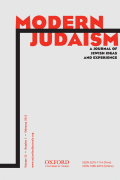
MODERN JUDAISM
Scope & Guideline
Advancing Understanding of Jewish Identity and Practice
Introduction
Aims and Scopes
- Jewish Theology and Philosophy:
The journal frequently addresses contemporary theological discussions within Judaism, featuring works that explore the thoughts of influential Jewish theologians and philosophers, such as Martin Buber and Irving Greenberg. - Cultural Studies and Historical Contexts:
Papers often delve into the cultural legacies of Jewish figures and movements, tracing historical developments and their implications for modern Jewish life. - Interdisciplinary Approaches to Jewish Identity:
The journal encourages a variety of methodologies, including sociological, literary, and historical analyses, to understand evolving Jewish identities in contemporary contexts. - Ethical and Social Issues:
There is a consistent focus on ethical dilemmas and social issues within Jewish communities, including discussions on feminism, antisemitism, and the role of Jewish thought in addressing modern challenges. - Community Practices and Rituals:
Research on community-specific practices, such as the rituals within ultra-Orthodox communities, provides insight into the lived experiences of Jews today, reflecting on how tradition interacts with modernity.
Trending and Emerging
- Neo-Hasidism and Modern Spirituality:
The rise of interest in Neo-Hasidism indicates a growing trend towards exploring spirituality that bridges traditional Jewish mysticism with modern sensibilities, appealing to a contemporary audience seeking deeper meaning. - Intersection of Judaism and Global Issues:
Papers addressing broader social and political issues, such as antisemitism, the role of Jewish communities in global contexts, and interfaith dialogues, reflect an emerging trend towards understanding Judaism's relevance in a globalized world. - Theological Pluralism and Diversity:
Recent publications emphasize diverse theological perspectives within Judaism, highlighting pluralistic approaches to Jewish identity and belief systems, which resonate with contemporary movements advocating inclusivity. - Digital Judaism and Technology:
Emerging discussions on the impact of digital technology on Jewish practices and identity reflect a timely engagement with how modernity reshapes religious experiences and community interactions. - Feminist Perspectives in Judaism:
An increasing number of articles focus on feminist interpretations and the role of women in contemporary Jewish life, indicating a significant trend towards gender inclusivity in Jewish scholarship.
Declining or Waning
- Historical Jewish Movements:
There has been a noticeable decline in papers focusing on historical Jewish movements, particularly those from earlier centuries, as contemporary issues and figures take precedence. - Traditional Halachic Discourse:
The discourse surrounding traditional halachic interpretations appears to be waning, with fewer articles dedicated to strict legalistic discussions in favor of broader ethical and philosophical explorations. - Diaspora Relations:
Discussions specifically addressing the relationship between Jewish communities in the diaspora and Israel have become less frequent, possibly reflecting a shift in focus towards more localized and community-specific issues.
Similar Journals

Journal for the Study of Judaism
Fostering Dialogue in the Study of JudaismJournal for the Study of Judaism, published by BRILL, serves as a vital platform for scholarly discourse in the fields of History, Literature and Literary Theory, and Religious Studies. With a commendable impact factor and ranking in the Q2 and Q3 quartiles across its respective categories, this journal facilitates high-quality research that explores the multi-faceted dimensions of Jewish studies from its inception in 1970 to the present day. For those who engage with the journal, the commitment to rigorous peer-review processes ensures publication of significant articles that advance knowledge and foster discussions within the academic community. As an essential resource for researchers, professionals, and students alike, the journal continues to enrich the understanding of Judaism through esteemed contributions of scholarship and critical analysis. The journal’s rich legacy and commitment to excellence make it an indispensable tool for those seeking to deepen their insight into Jewish studies and its broader implications.
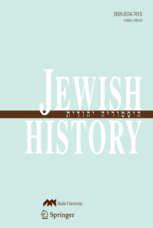
Jewish History
Charting the Course of Jewish Heritage and CultureJewish History is a significant academic journal published by Springer, focusing on the multifaceted historical narratives of Jewish communities worldwide. With roots tracing back to 1986, this esteemed journal offers an intellectual platform where researchers and scholars can engage critically with the vast and rich tapestry of Jewish heritage, culture, and experiences. Although it operates under a traditional subscription model, the journal has gained a notable standing in recent years, achieving a Q4 ranking in Cultural Studies and a Q3 ranking in History for 2023, reflecting its robust scholarly contributions. The journal is indexed in Scopus, with a rank of #808 in Arts and Humanities History and #754 in Social Sciences Cultural Studies, placing it within the competitive landscape of academic publishing. Its commitment to advancing the field of Jewish studies makes it an essential resource for researchers, professionals, and students alike, who seek to deepen their understanding of Jewish history from historical, cultural, and social perspectives.

Studia Ceranea
Advancing the Frontiers of Cultural ExplorationStudia Ceranea is an esteemed academic journal published by WYDAWNICTWO UNIWERSYTETU LODZKIEGO, dedicated to advancing research in the fields of Cultural Studies, History, and Religious Studies. With an ISSN of 2084-140X and an E-ISSN matching, this journal has been a pivotal platform for scholarly dialogue since its establishment, now enjoying an Open Access format since 2016, which fosters greater accessibility of its articles. Based in Poland, Studia Ceranea has witnessed significant convergence, with publication efforts spanning from 2011 to 2024. The journal's current standing is reflected in its quartile rankings, placing it in the Q4 category for 2023 across Cultural Studies, History, and Religious Studies. Additionally, it sits at rank #1124 in History and #414 in Religious Studies within Scopus ranks, evidencing its role in the wider academic landscape. Researchers, professionals, and students alike are encouraged to engage with this journal as it continues to explore and illuminate critical themes within the humanities and social sciences.

Tradition-A Journal of Orthodox Jewish Thought
Challenging Perspectives, Inspiring InquiryTradition: A Journal of Orthodox Jewish Thought is a prestigious academic journal published by the Rabbinical Council of America, dedicated to the exploration and analysis of Orthodox Jewish thought and its implications on contemporary issues. With a legacy dating back to 1973, this journal serves as a crucial platform for scholars, theologians, and students interested in the rich tapestry of Jewish philosophy, law, and ethics. Although it does not offer open access, its thoughtful, peer-reviewed articles are essential for advancing knowledge in Jewish academia and fostering dialogue within the broader cultural context. As an authoritative voice in the field, Tradition invites submissions that challenge, inform, and inspire further inquiry into the complexities of Jewish tradition, ensuring that it remains at the forefront of scholarly discussion.
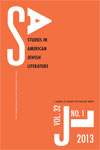
Studies in American Jewish Literature
Fostering Critical Dialogue on Jewish Cultural NarrativesStudies in American Jewish Literature, published by Penn State University Press, is a premier academic journal that delves into the rich tapestry of Jewish literary expression in America. With an ISSN of 0271-9274 and an E-ISSN of 1948-5077, this journal serves a vital role in the fields of Literature and Literary Theory, Cultural Studies, and Anthropology, as evidenced by its placement in the Q1 to Q3 quartiles across various categories in 2023. The journal is a key platform for researchers, professionals, and students interested in exploring the intersection of Jewish identity and American literature, contributing to a deeper understanding of cultural narratives and societal impacts. The publisher's commitment to scholarly excellence ensures that each issue is meticulously curated, showcasing innovative research and critical analysis. While not open access, the journal provides essential insights for anyone engaged in the study of Jewish literature or the broader cultural dynamics at play in American society. Stay informed on contemporary themes and historical contexts that shape literary discourse through this commendable publication.
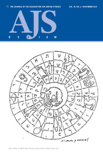
AJS Review-The Journal of the Association for Jewish Studies
Exploring Jewish Narratives and Heritage with Scholarly PrecisionAJS Review - The Journal of the Association for Jewish Studies is a leading academic journal published by the University of Pennsylvania Press, dedicated to advancing scholarship in Jewish studies. With its ISSN 0364-0094 and E-ISSN 1475-4541, the journal offers a rich compendium of research from various disciplines, including cultural studies, history, literature and literary theory, and religious studies. Recognized within the Q2 and Q3 quartiles across multiple categories in 2023, AJS Review provides an esteemed platform for academics to disseminate innovative ideas and engage with critical issues relevant to Jewish history and culture from 1976 to 2024. Although not an open-access journal, it ensures that high-quality, peer-reviewed articles are available to a global audience, enabling researchers, professionals, and students to foster deeper insights into Jewish narratives and heritage. By promoting interdisciplinary dialogue, AJS Review is integral to the academic community, offering valuable contributions to our understanding of Jewish studies and its broader implications.

Jewish Studies Quarterly
Exploring Jewish Identities Across Time and SpaceJewish Studies Quarterly, published by MOHR SIEBECK, is a leading academic journal dedicated to advancing scholarship in the field of Jewish studies. With its ISSN 0944-5706 and E-ISSN 1868-6788, this journal provides a platform for rigorous research that explores various dimensions of Jewish history, culture, religious practices, and contemporary issues. Although it does not currently offer open access options, it remains an essential resource for researchers, professionals, and students seeking insightful analysis and academic discourse. The journal is widely recognized for its commitment to excellence and contribution to understanding Jewish identities within global contexts. Located in Tübingen, Germany, Jewish Studies Quarterly is integral to the dialogue and scholarship surrounding Jewish thought and heritage, making it a vital reference point in the academic community.

Review of Rabbinic Judaism
Illuminating the Legacy of Rabbinic JudaismReview of Rabbinic Judaism is a distinguished academic journal published by BRILL, focusing on the intricate history and development of Rabbinic Judaism from its origins to contemporary implications. Since its inception in 1998, it has catered to a broad audience of researchers, professionals, and students interested in the historical and religious dimensions of Judaism. The journal is currently recognized within the Q2 category in both History and Religious Studies as of 2023, indicating its significant role in scholarly discourse. Although it is not an Open Access journal, it remains accessible through various academic institutions and libraries globally. The journal's broad scope allows for diverse articles that explore theological, cultural, and textual analysis, making it a vital resource for those dedicated to the study of Jewish texts and traditions. Located in the Netherlands, Review of Rabbinic Judaism continues to contribute to the academic landscape by fostering a deeper understanding of Rabbinic thought.

JEWISH SOCIAL STUDIES
Illuminating the past, present, and future of Jewish social thought.Jewish Social Studies is a prominent peer-reviewed journal published by Indiana University Press, dedicated to advancing the field of Jewish scholarship through interdisciplinary exploration and critical inquiry. With an ISSN of 0021-6704 and an E-ISSN of 1527-2028, this journal has become a vital resource for researchers and scholars, achieving Q2 rankings in both History and Religious Studies, as well as strong standings in Anthropology and Cultural Studies. The journal bridges the gaps between diverse academic disciplines, focusing on the multifaceted dimensions of Jewish life, culture, and history, making it essential reading for anyone engaged in the study of Judaism. Although it does not currently offer Open Access options, the journal promotes a wealth of rigorous research, critical perspectives, and in-depth analyses that contribute significantly to the understanding of Jewish Studies from 1975 to the present day, with ongoing issues scheduled until 2024. With an established audience of scholars, professionals, and students, Jewish Social Studies remains a leading platform for intellectual discourse and scholarly exchange in the humanities.
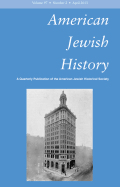
AMERICAN JEWISH HISTORY
Documenting Heritage, Inspiring Future GenerationsAMERICAN JEWISH HISTORY is a premier academic journal published by Johns Hopkins University Press, dedicated to the exploration and analysis of the Jewish experience in the American context. With ISSN 0164-0178 and E-ISSN 1086-3141, this journal serves as a vital resource for scholars and students in the fields of cultural studies, history, and religious studies, as evidenced by its placement in the Q3 quartile across these disciplines in 2023. Reaching a broad audience interested in the historical, social, and cultural dimensions of the American Jewish narrative, the journal has converged in various years, ensuring a robust collection of multidisciplinary research and discussions. Although it operates under a traditional subscription model, the journal remains an essential platform for critical analysis, fostering deeper understanding of Jewish identity and history. With Scopus rankings placing it at the 60th percentile in History and 62nd percentile in Religious Studies, AMERICAN JEWISH HISTORY stands as a respected publication that significantly contributes to the discourse surrounding Jewish history and culture in the United States.